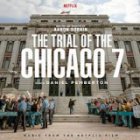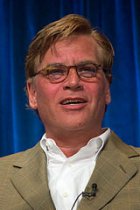
The Trial of the Chicago 7 Page #17
- Year:
- 2020
- 284 Views
HOWARD:
Whether you like the law or not, as
a former A.G. he’s protected by it.
KUNSTLER:
No, you’re protected by it-
(to CLARK)
--and due respect, sir, I can
subpoena you.
HOWARD:
Find a judge in this circuit who’ll
sign that subpoena.
CLARK:
He’s right. And taking the stand
voluntarily would be a big risk for
me.
KUNSTLER:
Again, due respect, but my clients
take a much bigger risk when they-
CLARK:
What took you so long?
KUNSTLER:
(beat)
--when they stand up against
enormous power they can’t see and-I’m
sorry, what took me so long to
do what?
CLARK:
To realize I’m your star witness?
KUNSTLER’s a little thrown now...
121.
KUNSTLER:
(beat)
Well...we were...remarking on that
ourselves, but-
CLARK:
Bill-
HOWARD:
He can’t testify.
CLARK:
I’m in private practice now and if
John Mitchell wants to cut me in
half, he can and he will.
TOM:
You have to find--Sir, you have to
find some courage now and
CLARK:
Find some courage, yeah.
TOM:
Yes--You have to find some courage
and-
WEINGLASS:
(holding a hand up)
Tom.
CLARK:
That’s what these two men came to
tell me. That if John Mitchell
wants to cut me in half, he can and
he will. So I wanted them here in
the room when I said--When do you
want me in court?
The room freezes for a moment...
HOWARD:
Mr. Clark-
KUNSTLER:
I’m sorry?
CLARK:
Swear me in, Bill.
HOWARD:
It’s against the law for you to
testify, Ramsey, it’s that simple.
122.
CLARK:
It’s General Clark and arrest me or
shut the f*** up.
(to TOM--simply)
Found it.
162 INT. COURTROOM -DAY 162
TITLE:
Trial Day 124
KUNSTLER:
The defense calls Ramsey Clark.
SCHULTZ:
Your Honor, the People move to
disallow this witness.
JUDGE HOFFMAN:
I’d like the marshals to take the
jury from the room.
As the marshals lead the jury out of the room we see that
HOWARD and CALLEY are in the gallery now--poker faced.
JUDGE HOFFMAN (CONT'D)
Mr. Schultz?
SCHULTZ:
The Code of Federal Regulations
mandates that the disclosure of
Justice Department material is
prohibited without prior knowledge
of the Attorney General--plainly
meaning the sitting Attorney
General--who is John Mitchell who
has specifically denied his
approval.
WEINGLASS:
Judge, the rule refers to very
specific kinds of documents and
information. If the regulation was
interpreted as Mr. Schultz is
asking it to be, nobody in the
federal government would ever be
able to testify in a trial after
leaving their job.
123.
JUDGE HOFFMAN:
I think the government is at least
justified in asking the defense to
demonstrate by voir dire the
testimony it expects to illicit
from the witness.
KUNSTLER:
You’d like us to question the
witness outside the presence of the
jury?
JUDGE HOFFMAN:
If I find any of the testimony
relevant I’ll call the jury back in
to hear it.
(pause)
Take it or leave it, Mr. Kunstler.
KUNSTLER doesn’t have a choice...
KUNSTLER:
Defense calls Ramsey Clark.
CLARK steps to the witness box where the BAILIFF is ready
with a Bible.
BAILIFF:
State your name.
CLARK:
William Ramsey Clark.
BAILIFF:
Do you swear that the testimony you
give will be the truth, the whole
truth and nothing but the truth?
CLARK:
I do.
KUNSTLER:
Mr. Clark, what was your occupation
in the summer of 1968?
CLARK:
I was Attorney General of the
United States.
KUNSTLER:
You were appointed by President
Johnson.
124.
CLARK:
Yes.
KUNSTLER:
And confirmed by the United States
Senate.
CLARK:
Yes.
KUNSTLER:
Did you receive a phone call at
your office at 11:50 A.M. On
September 10th of last year?
CLARK:
Yes.
KUNSTLER:
From whom was the call?
CLARK:
President Johnson.
KUNSTLER:
Will you state what President
Johnson said to you and what was
said to him?
SCHULTZ:
Your Honor, at this point we’ll
object. A cabinet officer does not
have to and should not have to
relate the contents a private call
he had with the President.
JUDGE HOFFMAN:
I’ll sustain the objection.
KUNSTLER:
Please the court, this is voir
dire, I thought objections were
reserved.
JUDGE HOFFMAN:
There’s a question of
attorney/client privilege to
consider.
CLARK:
The president isn’t a client of the
Attorney General.
125.
JUDGE HOFFMAN:
(beat)
Excuse me, sir?
CLARK:
The president isn’t a client of the
Attorney General. I’m happy to
answer.
There’s a moment of awkward silence...
SCHULTZ:
Your Honor, I don’t--hearing from
the witness on this point is highly
irregular.
JUDGE HOFFMAN:
(pause)
Well gentlemen, I’m...This is my
courtroom but the witness is the
former--he’s--and he’s just stated
his willingness, you know--so for
the purposes of voir dire I’ll hear
the answer.
CLARK:
The President asked me if I
intended to seek any indictments
related to the riots the previous
month in Chicago.
KUNSTLER:
And what did you tell him?
CLARK:
I told him we wouldn’t be seeking
indictments.
KUNSTLER:
Can you tell us why?
CLARK:
An investigation by our criminal
division led to the clear
conclusion that the riots were
started by the Chicago Police
Department.
The DEFENDANTS--except TOM and RENNIE--along with many in the
gallery jump up and CHEER, banging the table and shouting.
KUNSTLER gives them a look as JUDGE HOFFMAN gavels the room
to order.
126.
KUNSTLER:
Did your counter-intelligence
division make a report as well.
CLARK:
They concluded that there had been
no conspiracy on the part of the
defendants to incite violence
during the convention.
KUNSTLER:
What happened on the first Tuesday
after the first Monday in November
of that year?
CLARK:
Richard Nixon was elected
president.
JUDGE HOFFMAN:
Sustained.
KUNSTLER:
(beat)
Nobody objected.
SCHULTZ:
We do. It’s well known that there’s
no love lost between the witness
and the sitting Attorney General.
The witness has been called to wage
a political attack and he should
not be allowed to appear before the
jury.
JUDGE HOFFMAN:
Mr. Kunstler?
KUNSTLER:
considering not allowing the jury
to hear what we’ve just heard.
SCHULTZ:
The witness can’t present to them
testimony that will assist in
making a determination of guilt or
innocence.
KUNSTLER:
He just testified that his own
Justice Department came to the
conclusion-
127.
SCHULTZ:
And the current Justice Department-the
only one that matters--came to
a new conclu-
KUNSTLER:
And therefore the motivation of the
prosecution is now called into-
SCHULTZ:
The motivation of the prosecution
isn’t an issue in a courtroom.
KUNSTLER:
Not any courtroom I’ve ever been in
except this one!
FORAN:
Object!
JUDGE HOFFMAN:
Mr. Kunstler, do you have any
further examination that will
demonstrate that this witness will
make a material contribution or
should I ask him to step down?
KUNSTLER:
You’ve ruled? You’re not going to
let the jury hear his testimony?
Translation
Translate and read this script in other languages:
Select another language:
- - Select -
- 简体中文 (Chinese - Simplified)
- 繁體中文 (Chinese - Traditional)
- Español (Spanish)
- Esperanto (Esperanto)
- 日本語 (Japanese)
- Português (Portuguese)
- Deutsch (German)
- العربية (Arabic)
- Français (French)
- Русский (Russian)
- ಕನ್ನಡ (Kannada)
- 한국어 (Korean)
- עברית (Hebrew)
- Gaeilge (Irish)
- Українська (Ukrainian)
- اردو (Urdu)
- Magyar (Hungarian)
- मानक हिन्दी (Hindi)
- Indonesia (Indonesian)
- Italiano (Italian)
- தமிழ் (Tamil)
- Türkçe (Turkish)
- తెలుగు (Telugu)
- ภาษาไทย (Thai)
- Tiếng Việt (Vietnamese)
- Čeština (Czech)
- Polski (Polish)
- Bahasa Indonesia (Indonesian)
- Românește (Romanian)
- Nederlands (Dutch)
- Ελληνικά (Greek)
- Latinum (Latin)
- Svenska (Swedish)
- Dansk (Danish)
- Suomi (Finnish)
- فارسی (Persian)
- ייִדיש (Yiddish)
- հայերեն (Armenian)
- Norsk (Norwegian)
- English (English)
Citation
Use the citation below to add this screenplay to your bibliography:
Style:MLAChicagoAPA
"The Trial of the Chicago 7" Scripts.com. STANDS4 LLC, 2025. Web. 14 Mar. 2025. <https://www.scripts.com/script/the_trial_of_the_chicago_7_25401>.







Discuss this script with the community:
Report Comment
We're doing our best to make sure our content is useful, accurate and safe.
If by any chance you spot an inappropriate comment while navigating through our website please use this form to let us know, and we'll take care of it shortly.
Attachment
You need to be logged in to favorite.
Log In